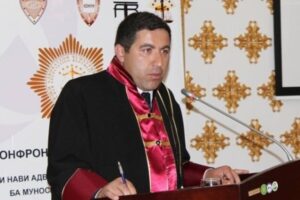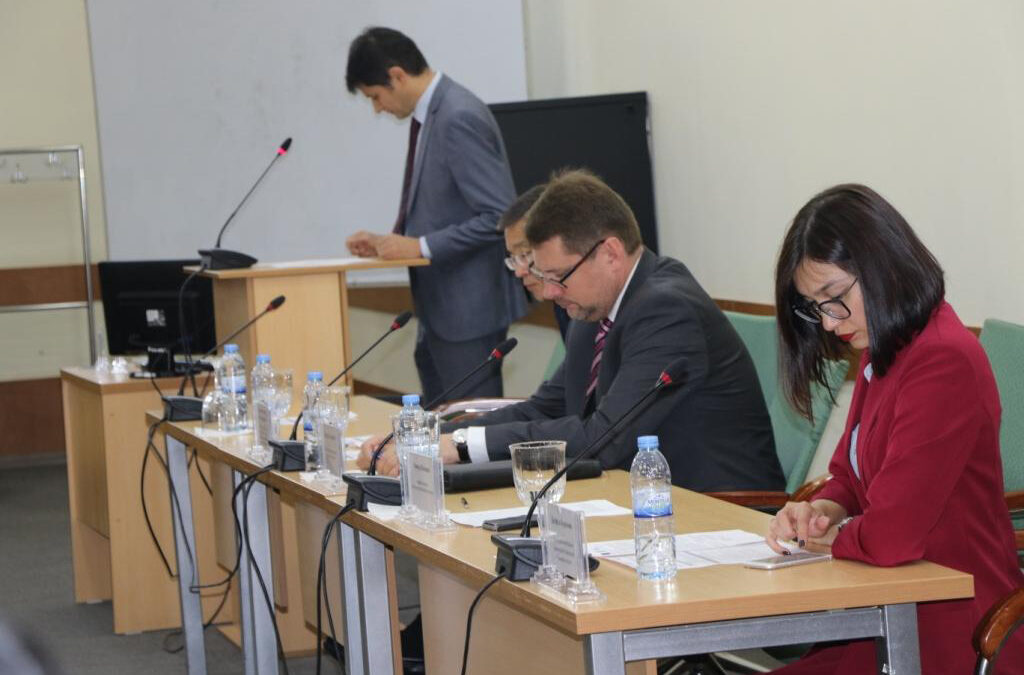
Sep 18, 2018 | News
Today, the ICJ and the Tashkent State University of Law (TSUL) are launching a series of expert discussions on economic, social and cultural rights (ESC) to advance civil society in promoting these rights in Uzbekistan.
These expert discussions are part of the project “Access to justice in economic, social and cultural rights project (ACCESS)” supported by the European Union.
They aimed to increase awareness about the implementation of international law and standards on ESC rights before national courts, to facilitate access to justice for ESC rights and effective use of international human rights law for ESC rights.
Every two months, they will bring together lawyers, advocates, specialists, academia and law students via interactive discussions, research papers, peer review articles and policy papers. Selected papers will be published by the end of 2019.
“The cooperation of our university with the ICJ and with support of the European Union opens big perspectives for all of us,” said Esemurat Kaniyazov, Rector of TSUL and Deputy minister of justice of the Republic of Uzbekistan.
“Tashkent State University of Law (TSUL) is happy to start cooperation with the International Commission of Jurists (ICJ), which will have an impact into further increase of awareness level of the society about implementation of the international legal norms and standards in economic, social and cultural rights in domestic courts, access to justice from point of view of economic, social and cultural rights and also effective application of international human rights law for protection of these rights,” he added.
“So, planned cooperation will affect further progress in conducting research of the normative and legal base of Uzbekistan in economic, social and cultural tights and follow the obligations of the international human rights law,” Kaniyazov said.
“These discussions on economic, social and cultural rights as justiciable rights in light of international human rights law are crucial for the understanding the legal nature of ESC rights and ability of individuals to have access to justice when defending them,” said Temur Shakirov, Senior legal adviser of ICJ.
“Economic, social and cultural rights including the right to work and equitable conditions of work, social security, family life and access to housing, food, water, health care and education and other human rights can and must be guaranteed as enshrined in the International Covenant on Economic, Social and Cultural rights to which Uzbekistan is a party. The ICJ looks forward to this initiative we are starting jointly with the TSUL,” he added.
Contact:
Dilfuza Kurolova, ICJ Legal consultant, t: +998 90 9050099 ; e: dilfuza.kurolova(a)icj.org
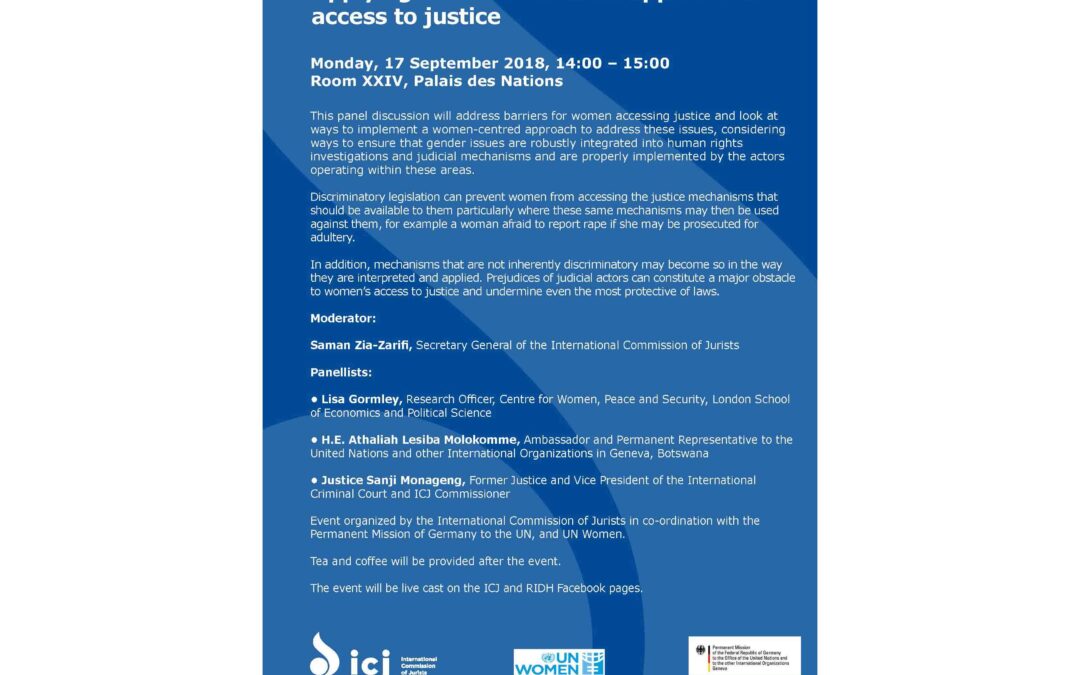
Sep 17, 2018 | Events, Multimedia items, News, Video clips
This panel discussion was held today at the Palais des Nations in Geneva.
The event addressed barriers for women accessing justice and look at ways to implement a women-centred approach to address these issues, considering ways to ensure that gender issues are robustly integrated into human rights investigations and judicial mechanisms and are properly implemented by the actors operating within these areas.
Discriminatory legislation can prevent women from accessing the justice mechanisms that should be available to them particularly where these same mechanisms may then be used against them, for example a woman afraid to report rape if she may be prosecuted for adultery.
In addition, mechanisms that are not inherently discriminatory may become so in the way they are interpreted and applied. Prejudices of judicial actors can constitute a major obstacle to women’s access to justice and undermine even the most protective of laws.
Moderator:
Saman Zia-Zarifi, Secretary General of the International Commission of Jurists
Panellists:
• Lisa Gormley, Research Officer, Centre for Women, Peace and Security, London School of Economics and Political Science
• H.E. Athaliah Lesiba Molokomme, Ambassador and Permanent Representative to the United Nations and other International Organizations in Geneva, Botswana
• Justice Sanji Monageng, Former Justice and Vice President of the International Criminal Court and ICJ Commissioner
Event organized by the ICJ in co-ordination with the Permanent Mission of Germany to the UN, and UN Women.
Watch the video:
https://www.facebook.com/ridhglobal/videos/565112000574216/
Side event ICJ WHR (flyer in PDF)
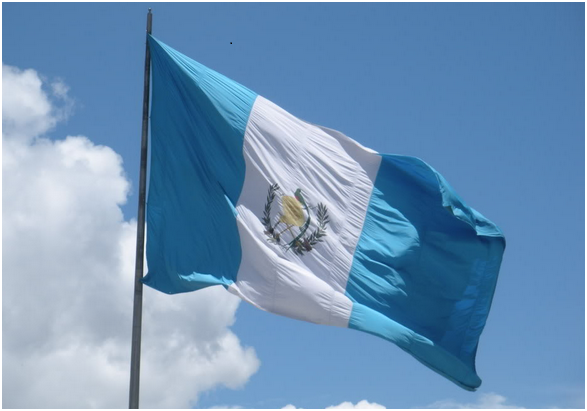
Sep 17, 2018 | Artículos, Noticias
La Corte de Constitucionalidad hizo pública ayer 16 de septiembre, su decisión de ordenar permitir el ingreso al país, del comisionado de la Comisión Internacional contra la Impunidad (CICIG), Iván Velásquez.
La CIJ celebra dicha decisión, ya que permitirá continuar el trabajo de la CICIG y de esta forma la decisión de la Corte de Constitucionalidad, logrará remover uno de los obstáculos más apremiantes, impuestos por el propio Presidente de la República, para el cumplimiento de las obligaciones internacionales del Estado de Guatemala, contenidas en el Acuerdo Internacional de Derechos Humanos que crea dicha comisión.
Con respecto a los recursos de amparo que buscan dejar sin efecto la decisión del Presidente de la República de no prorrogar el mandato de la CICIG, la Corte de Constitucionalidad (CC) decidió no otorgar el amparo provisional y, por lo tanto, los procesos deberán continuar hasta su resolución final.
Para el efecto, la CIJ insta a la Corte de Constitucionalidad, a respetar los plazos legales y resolver finalmente los recursos de amparo, conforme los principios, costumbre internacional y normas del Derecho Internacional de los Derechos Humanos.
La CIJ reitera que el no prorrogar el mandato de la CICIG, también podría causar un grave daño a la justicia y ser un obstáculo definitivo para el cumplimiento de las obligaciones internacionales del Estado de Guatemala, de combatir la impunidad.
Con respecto al diálogo que deberá continuar para resolver las diferencias, según el artículo 12 del Acuerdo Internacional de Derechos Humanos citado, la CIJ considera que es necesario incorporar a dicho diálogo, al Procurador de los Derechos Humanos y a la Sociedad Civil organizada, que fueron precisamente quienes propusieron la creación de tan importante comisión.
Uno de los puntos fundamentales a analizar entre todos los actores involucrados, entre otros temas, es si las entidades estatales nacionales ya están suficientemente fortalecidas y capacitadas para continuar la lucha contra la impunidad, sin el apoyo de la CICIG.
La CIJ considera que para seguir impulsando acciones eficientes en la lucha contra la corrupción e impunidad, es de vital importancia suspender los efectos de la decisión gubernamental, de no prorrogar el mandato de la CICIG.
De esta forma, se dará mayor confianza y viabilidad al diálogo entre todas las partes sobre el futuro de la CICIG; además, de esta forma se protegerán los derechos de la población guatemalteca.
Ramón Cadena, Director de la Comisión Internacional de Juristas para Centroamérica expresó: “Falta revertir la decisión del Presidente Jimmy Morales de no prorrogar el mandato de la CICIG. De esta forma, quedarán removidos todos los obstáculos impuestos a la CICIG y se contribuirá al fortalecimiento del Estado de Derecho en el país.”
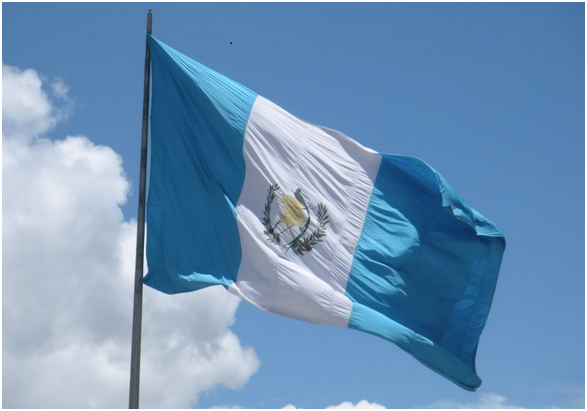
Sep 17, 2018 | News
On 16 September, the Constitutional Court made public its decision to order that the Commissioner of the International Commission against Impunity (CICIG) Iván Velásquez be permitted to re-enter the country.
For more than a decade, the UN-backed CICIG has helped investigate high-profile officials for corruption.
Under the tenure of head commissioner Ivan Velasquez, the CICIG has helped Guatemalan prosecutors investigate and prosecute many high-level politicians, judges and government officials, including former president Otto Perez Molina and members of his cabinet.
Elected in 2015, current President Jimmy Morales initially supported the CICIG but he himself and other family members have become subjects of investigations into illegal campaign financing. They deny all charges.
President Morales declared on 31 August that he would not renew the mandate of the CICIG which is due to expire in September 2019 and then proceeded to ban Commissioner Velasquez from re-entering the country.
This decision sparked a number of protests including legal challenges in the Constitutional Court.
“The decision by the Constitutional Court should permit the CICIG to continue its work. It removes one of the greatest obstacles, imposed by order of Guatemalan President Jimmy Morales himself, to the fulfilment of Guatemala’s international obligations, as enshrined in the International Accord on Human Rights which created the Commission,” said Ramon Cadena, ICJ Director for Central America.
With respect to the amparo lawsuits which sought an injunction to reverse the the decision of the President Morales not to renew the mandate of the CICIG, the Constitutional Court declined to order provisional measures and therefore these legal proceedings will continue until they are determined in court.
“The ICJ urges the Constitutional Court to respect the legal time limits and to make a final decision on the lawsuit, in compliance with international human rights law and standards.
If the mandate of the CICIG were not renewed, it would seriously affect access to justice and constitute a major obstacle to the fulfilment of Guatemala’s international obligation to combat impunity,” Ramon Cadena added.
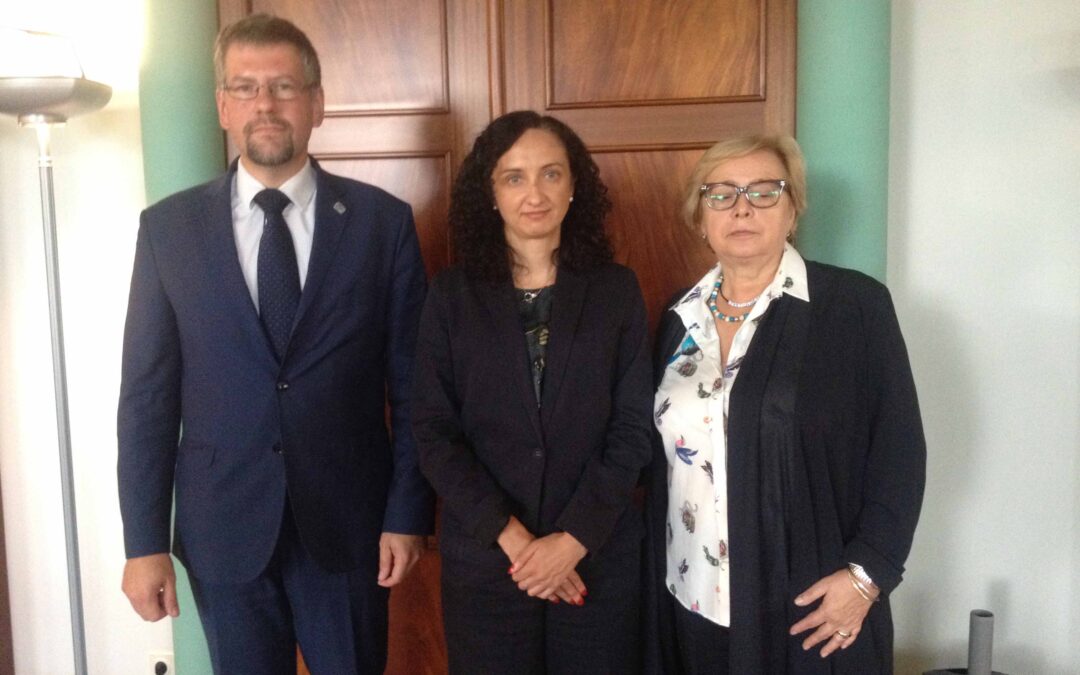
Sep 14, 2018 | News
The ICJ met this week in Warsaw with the First President of the Polish Supreme Court, Małgorzata Gersdorf.
Róisín Pillay, Director of the ICJ Europe and Central Asia Programme, met with President Gersdorf to convey the support of the ICJ for the Court’s defence of the rule of law and the independence of the judiciary in Poland, in the face of government attacks.
The ICJ emphasized that a new law on the Supreme Court that attempts to force the “retirement” of 27 of the 72 Supreme Court judges, including the First President, by lowering the mandatory retirement age for its judges from 70 to 65 years, contravenes international human rights law and standards, including the right to a fair hearing.
The measure is contrary to the principle of the security of tenure of judges and therefore to the independence of the judiciary, as expressed in the UN Basic Principles on the Independence of the Judiciary.
In August, the Supreme Court submitted a preliminary ruling request to the Court of Justice of the EU (CJEU) seeking its interpretation on the compliance of the measure with EU law. The Supreme Court has suspended implementation of the law pending the proceedings before the CJEU.
The European Commission has recognized the current situation as undermining “the principle of judicial independence, including the irremovability of judges” and has triggered a procedure under Article 7 of the Treaty of the European Union that could ultimately lead to suspension of Poland’s EU voting rights.
The Commission has also launched infringement proceedings against Poland in respect of the law on the Supreme Court.
An ICJ letter of 11 July 2018, signed by 22 senior judges from all regions of the world, urged the Polish government to act immediately to reinstate the forcibly retired judges in office.








